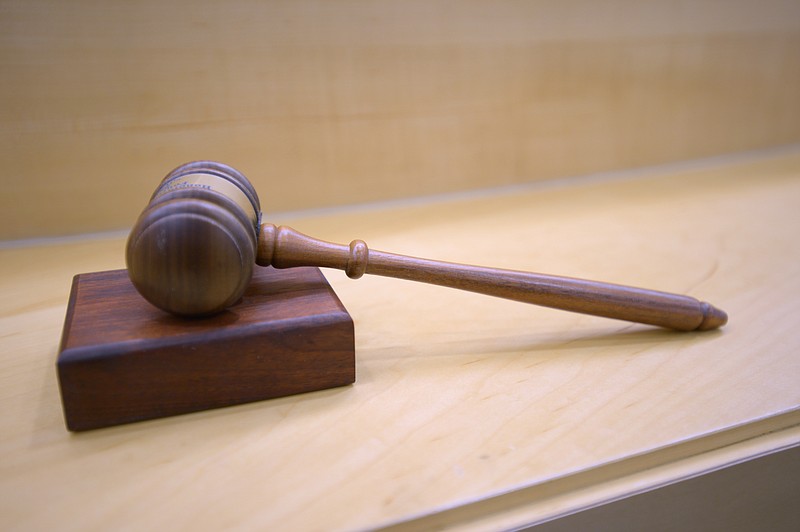The League of Women Voters is likely going to lose its lawsuit challenging an Arkansas Election Code provision, a Fayetteville federal judge told the group's lawyers, ending a nearly three-hour hearing Monday with that "head's up" warning.
"That's not a ruling," U.S. District Judge Timothy Brooks emphasized in closing the proceeding, promising to issue a written decision as soon as he can.
Brooks said he offered that insight into his thinking so League lawyers can start preparing what they'll do after receiving an adverse ruling. The judge did not say when he would issue his decision.
The Nov. 3 election is about seven weeks away, but practically, with absentee balloting deadlines looming this week, it's already started, state lawyers warned Brooks, predicting that if the judge sides with the League "election chaos" will ensue.
"Just the prospect of election chaos is sufficient to deny the plaintiff's petition," Assistant Solicitor General Michael Cantrell told the judge, who seemed skeptical of such a dire pronouncement.
The League's attorney also predicted terrible consequences if the judge rules against the nonpartisan civic organization and its claim the law is unconstitutional. Tens of thousands of Arkansas voters who signed a petition supporting a proposed Constitutional amendment would have their First Amendment free-speech rights "completely extinguished," the group's attorney said.
"The harm is real, and it affects more than 90,000 Arkansas voters," Ruth Greenwood, a Massachusetts attorney from the election-reform group Campaign Legal Center, told the judge.
Brooks is not being called on yet to make a final decision about the litigation. Rather, the purpose of Monday's hearing was whether the League is entitled to a preliminary injunction against the defendant, Republican Secretary of State John Thurston. The judge said the most important factor he has to consider is how likely the League is to win such a trial.
Not likely, Brooks said at the end of the 2-hour, 45-minute proceeding, although the judge also told the sides he had a lot to "mull over" about the challenge and that the League has to overcome several other legal "landmines" to win the injunction.
To prevail at this stage, the League must show the judge that it's likely to win the suit and must also rebuff arguments by Thurston's lawyers from the Arkansas attorney general's office that the lawsuit was deliberately filed at the last minute, deals with matters of state law beyond the federal court's jurisdiction, and involves legal issues that have already been resolved by other courts.
The League is backing a proposed constitutional amendment that would change how Arkansas legislative and congressional districts are set up by establishing a system that the proposal's supporters say would remove political considerations from the procedure.
Such a change requires voter approval, and the only way supporters can get the proposal on the November ballot is by collecting at least 89,152 signatures from registered voters on a petition. To collect that many signatures under the time constraints imposed by the law often requires supporters to hire canvassers. The proposal's sponsor reports having collected more than 144,000 signatures.
The Election Code provision League lawyers claim is illegal involves how paid canvassers are screened for criminal convictions that would disqualify them from collecting signatures.
The League's lawyers say the background-check provision found in Arkansas Code 7-9-601 is "impossible" to comply with because the law forces amendment supporters to either "lie" about the background checks or have their petitions rejected by election regulators. It's a "Kafkaesque system," the group's attorney told the judge.
Acknowledging that the law "could have been drafted better," the judge told the sides Monday his first impression is that the "impossible" argument did not appear persuasive. Brooks said he could see ways the law could be followed without anyone having to make false statements about the background checks.
The provision mandates that canvassers "pass" a background check but does not define what that means, and the Arkansas State Police and Arkansas Crime Information Center, which conducts those reviews, does not assign any kind of pass or fail grade to those checks, League lawyers say.
None of the canvassers had disqualifying criminal convictions, but the Arkansas Supreme Court ruled late last month that the proposal's sponsor, Arkansas Voters First, had not provided the proper certification for the background checks and, at the secretary of state's request, disqualified the proposal from the November election.
That ruling led to the federal lawsuit being filed last week. League lawyers said the First Amendment free-speech rights of the group's membership who signed the petition endorsing the proposal are in danger.
That's because the high court's interpretation of the background-check provision resulted in their signatures being thrown out, infringing on their right to speak on political issues, the attorneys claim.
The preliminary injunction the League seeks would be a court order to the secretary of state to complete the process of verifying that the petition signatures come from Arkansas voters.

